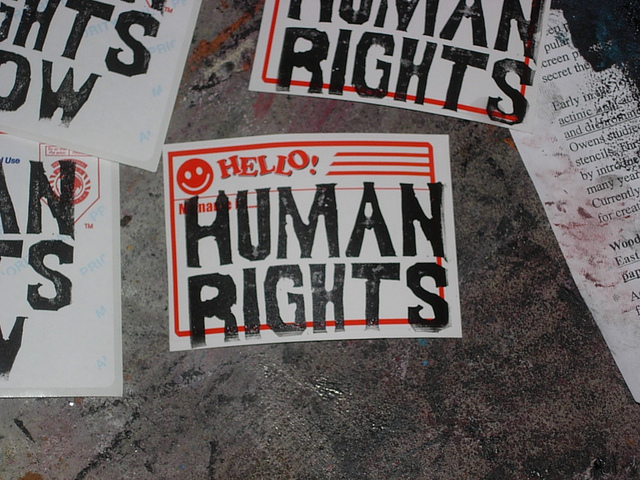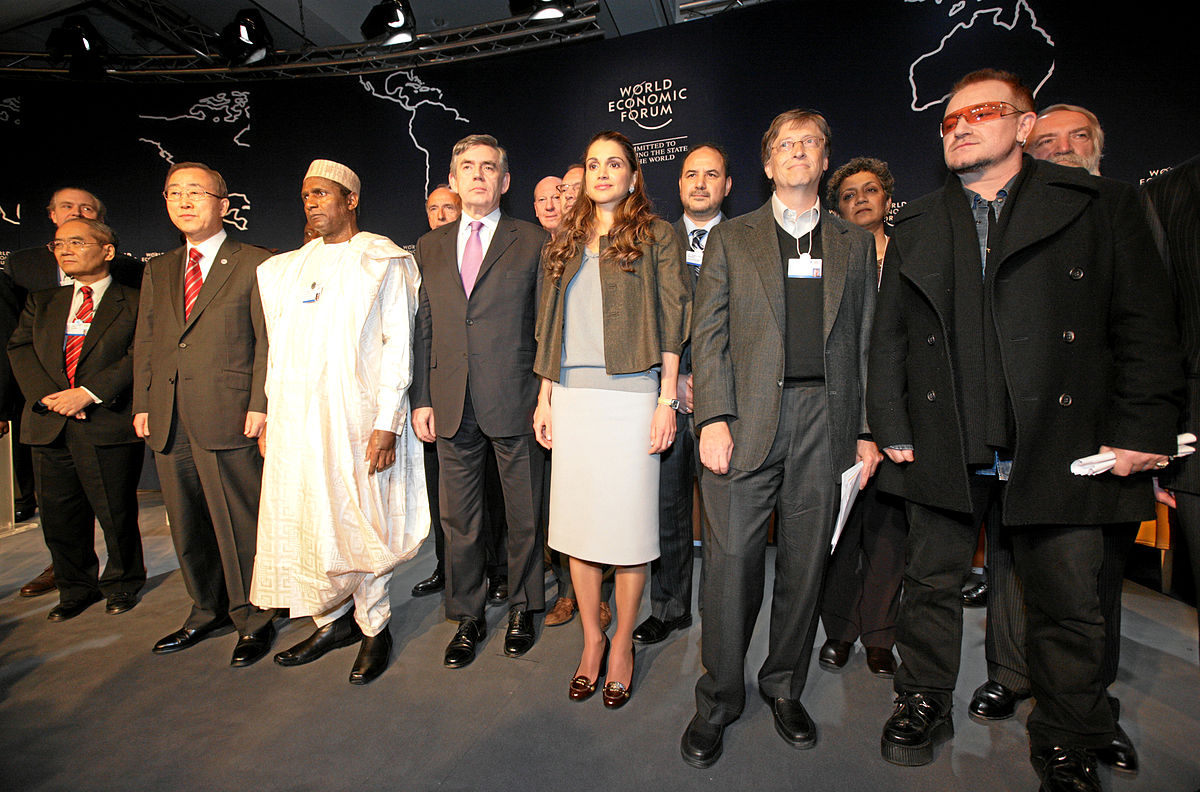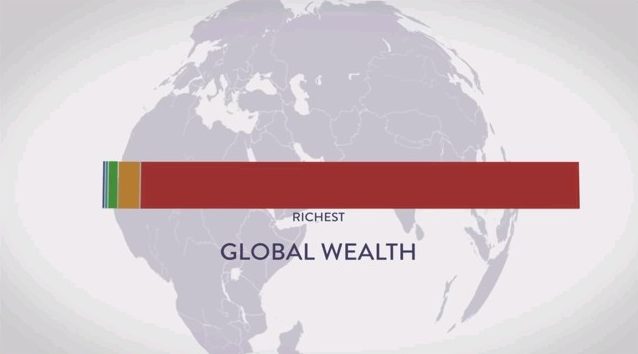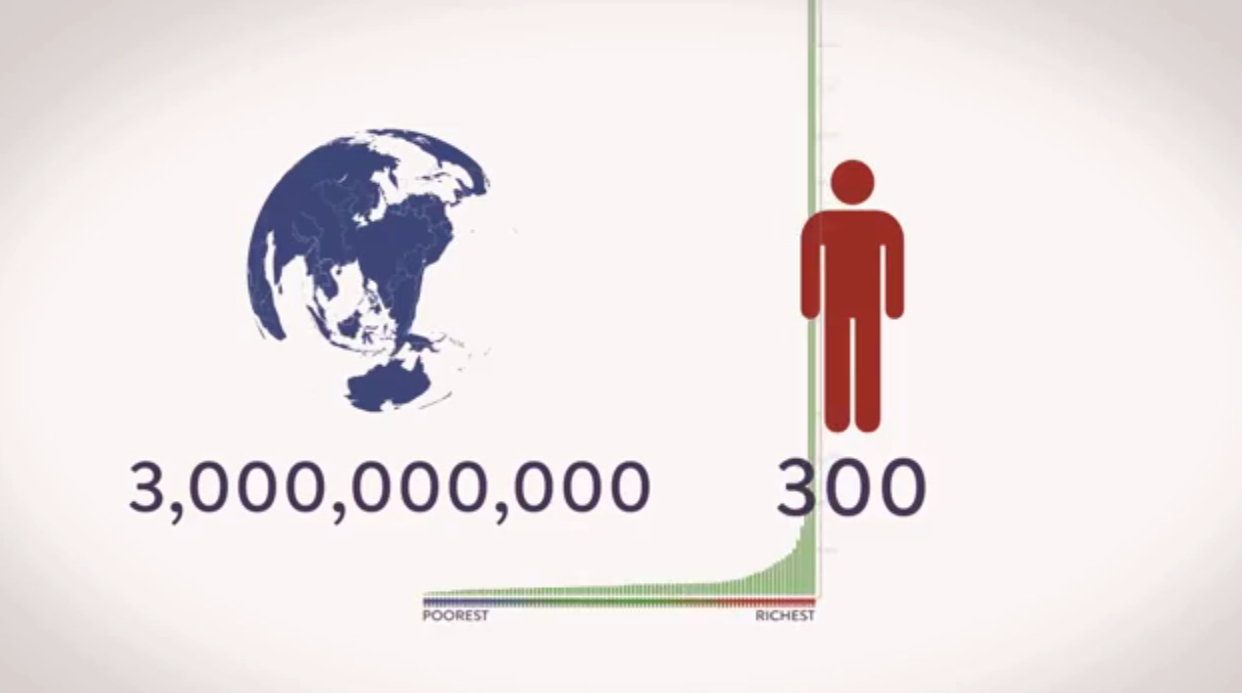
The collective net worth of the richest 1% of humankind recently broke above 50% of all the planet’s private wealth. Rich people care greatly about being rich, both absolutely and in comparison with others. They understand that relative wealth brings political influence – which can be used to amass even more wealth. They succeed at using their wealth and political influence to capture an ever-growing share of global wealth and income.
At the other end of the spectrum are the world’s poor. The collective net worth of humanity’s poorer half is only 0.6% of the planet’s private wealth – as much as is owned by the 62 richest billionaires. You saw this right: the 62 richest people now have as much wealth as the 3,700,000,000 poorest human beings.
It’s not that the rich hate the poor. They may even wish the poor were better off. But the rich care more about their own share of wealth and income. And as their share increases, the other shares must shrink – especially that of the poorest. During 1988-2008, the average income among the richest 1% increased by 66%, while the global average income increased by only 24.34%.
This is actually okay, the rich tell us: while the poor may be losing in relative terms, they are gaining in absolute terms thanks to global economic growth. The Millennium Development Goals have spread word of this progress, and their recent successors, the Sustainable Development Goals, continue to reinforce the message: the poor are becoming better off. Wherever anyone may draw the international poverty line, the proportion of humanity living below it is shrinking.
This information is less comforting once we attend to what those in the poorer half can actually afford with their tiny incomes of $4–$20 per person per week. Most of them suffer at least one severe deprivation such as lack of adequate nutrition, safe drinking water, adequate housing, electricity, adequate sanitation, literacy, schooling or access to essential medicines. Each year, some 18 million people die prematurely from poverty-related causes, such as malnutrition, diarrhea, childbirth complications, childhood diseases, pneumonia, tuberculosis, malaria, HIV/AIDS – conditions that hardly cause any premature deaths in affluent countries.
This global disaster engages human rights, for instance Article 25 of the Universal Declaration: “Everyone has the right to a standard of living adequate for the health and well-being of himself and of his family, including food, clothing, housing and medical care and necessary social services.” Where rights are at stake, immediate action is required. Those who continue to uphold the existing, highly skewed international economic and financial order delay the realization of human rights by many decades, thereby becoming responsible for hundreds of millions of poverty-related deaths in the meantime. If a more poverty-avoiding global order is possible, we must implement it as fast as we possibly can.
Rewriting the rules of the global economy
We can rapidly realize the human rights of the world’s poor through global institutional reforms if these reforms reduce inequality – if they reverse the relentless rise in the share in global wealth and income going to the richest 1%. Think about it. It would take 2.4% of global private wealth to multiply the net worth of the poorer half by 5, namely from 0.6% to 3%. If this shift came entirely at the expense of the richest 1%, their share would decline from 50.4% to 48% of global private wealth. Would they not still have enough?
What sort of institutional reforms would rapidly improve the situation of the world’s poor? After decades of forcing free trade upon the world, the affluent states should finally be required to abolish their protectionist barriers that impede exports from poor countries: subsidies, tariffs and “anti-dumping” duties. At the very least they should have to compensate poor countries for the economic losses these barriers cause them.
Similarly, those who produce disproportionally large amounts of greenhouse gas emissions should be required to compensate the world’s poor, who emit very little and are much more vulnerable to the effects of climate change. The needed funds should be raised by putting a price on emissions, with the additional benefit of slowing the increase of greenhouse gases in our atmosphere.
Rich corporations and individuals should finally be made to pay their fair share of taxes. There is an elaborate infrastructure of tax havens, secrecy jurisdictions, letterbox companies and sham trusts, with clever lawyers, bankers, accountants and lobbyists, all working hard to hide wealth and profits and to create and exploit loopholes. This shady network drains poor countries of capital and slashes their governments’ tax revenues. It also facilitates arms and drug trading, human trafficking, money laundering and terrorism. Reforms are underway, but they are driven by the interests of the affluent states, do not yet consider the poorer populations whose losses are much larger.
We should recognize the world’s poor as entitled to a share of our planet’s natural resource wealth. There is no good reason why a small minority of humanity should be accepted as owning these resources and as entitled to charge everyone else for access. It is especially pernicious to treat unelected rulers – dictators and juntas – as entitled to sell the natural resources of “their” country or to use them as collateral for loans that the population will then be required to repay. Such loans and resource purchases unjustly impoverish the country and strengthen its illegitimate rulers, thereby perpetuating the tyranny.
Poor people should not be excluded from medicines, seeds, and other important innovations by high patent-protected markups. It makes sense to reward innovators so as to incentivize the innovations we need. But we must find a way of doing so that does not exclude the poor. The Health Impact Fund is one feasible such way.
It is a modest but most stringent requirement that we rise together to change the rules of our global order so that they no longer violate the human rights of half the human population. Together we can do this and build a much more beautiful world.
Professor Thomas Pogge is the Director of the Global Justice Program and Leitner Professor of Philosophy and International Affairs at Yale University. He is also the founder of the Health Impact Fund and a board member of The Rules, a network of activists, writers, researchers, artists, coders and others focused on addressing the root causes of inequality and climate change.









Dear Professor Thomas Pogge,
Thank you for this information, Can I use your statistics for my book…
I am writing a book about America and the World issues
Our Need to give to the World.
My name is Lisa Lucia Arden
Best Regards,
Lisa Lucia Arden
Lisa,
Where do you live? I”m organzing US citizens to educate their poliicy makers on the need for global justice. It sounds like you would be a good individual to do this. And maybe educate others who are also committed to ‘life, liberty and justice for all’.
Dear Professor Chuck Wooley,
Good evening, I just received your email. I apologize I did not see your email sooner.
I would be honored to work on your team educating others about justice and liberty for all.
I live in Pasadena California. However, at the present I am visiting Germany, and possibly Italy, to see my daughter.
Thank you and Best Regards.
Merry Christmas,
Lisa Lucia Arden
luciaarden@hotmail.com
Dear Professor,
thank you reading these email.
I have written many of your same comments recognizing the atrocities of humanity.
I would like to use your statistics and other information, that supports my proclamation. Of course, I would directly quote you, Professor Pogge.
Please, would you consider my request.
Thank you,
Lisa Lucia Arden ,MDIV
Now in America, there is no housing for the homeless. It doesn’t matter how you get there, if the medical industry strips you of everything, if you lose your job and have no means to support yourself or your kids, or whether you are a drug addict the government will abandon you. In Los Angeles there is a 10,000 person waiting list for housing assistance, in San Diego there is an 8-10 year wait. In Arizona the support has been closed for years, they are not taking new applications and there is no prediction of when it might open again, Florida is shut down, North Carolina opened up for the second time in 14 years and got 10,000 applicants almost overnight. As I research state by state the same story is coming up. Washington state is closed. New York has 45,000 homeless children -that’s about the same population as the town of Niagara Falls. Imagine that, a town full of children, with no homes, nowhere to sleep at night, no fridge to put their milk in, nowhere to take a bath, no stove with which to cook their food. And that is what America does for the homeland security of its children!!!! Children can spend decades living in storm drains…
We pay the federal government $3 trillion a year for their services and we get this kind of horror instead, and we get VERY rich politicians and government workers with their security assured. It is time to stop paying these people for bad service and laws they make that harm us. Let’s keep those funds in our own communities and provide each other with real homeland security that has meaning to us. Let’s provide all our community with affordable housing no matter what, let’s provide healthcare that doesn’t bankrupt sick people but helps them, let’s provide meaningful education, let’s create co-operative businesses that share profits with the staff that makes them. And let’s create fair justice, ethical policing, and local government that is fierce and protects us. In one decade we would have pumped into our communities and into our economies $30 trillion dollars. That should lift all boats except for those full of people who are the predator class.
You missed a pivotal dot, money, or more specifically the money system. Nothing happens without it and those who control it control what happens to a larger extent than any of us are willing to admit. Seeing Wetiko, on this site, was pointing at the dot. I see its been taken down and misdirected, too bad, it was the key to understanding the rules that need to change. There are three that would shift the monetary paradigm from greed to care. They are in the Green Party platform under Greening the Dollar, the NEED Act HR2990, and the proposals of Positive Money UK, Ons Geld in the Nederlands, Sovereign Money in Germany, MOMO in Switzerland, Iceland and other nations who are beginning to recognize that you can’t have political democracy without economic democracy.. whose sheathed sword is money.